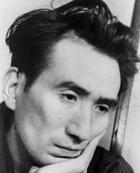
Osamu Dazai, pseudonym of Shuji Tsushima, was born in 1909 in Kanagi, in Aomori prefecture. He was the eighth surviving son of a rich landowner and a woman of fragile health, so he was raised by servants. A fan of licentious life, in 1927 he tried to commit suicide for the first time by ingesting barbiturates. In October 1930 he escaped from home with Hatsuyo Oyama, a low-ranking geisha, which led to his formal expulsion from the family. Ten days later he would try to commit suicide again, throwing himself into the sea next to a 19-year-old girl whom he had just met. She would die, but he would survive. After being readmitted by his family, he married Oyama. He then began to settle down and managed to obtain the patronage of the writer Masuji Ibuse, thanks to which he could start publishing his works. His first work ("Tren", 1933), already under a pseudonym, would also be his first experience with the genre of watakushi shosetsu, an autobiographical style in the first person in which he revealed himself as a teacher. After being rejected by a Tokyo newspaper in which he wanted to work, on March 19, 1935 he tried to hang himself without success. But the worst was yet to come. Less than three weeks later, Dazai became ill with appendicitis and entered a clinic, where he would become addicted to Pabinal, a painkiller based on morphine. In October 1936 he was transferred to a mental institution. During his "treatment," which lasted a month, his wife was cheating on him with his best friend. When Dazai finds out, he tries to commit double suicide with his own wife, taking pills. But neither of them dies and Dazai quickly requests a divorce. She remarries very soon after, this time with a high school teacher, Michiko Ishihara, who would give her three children. It would be after the war, in which Dazai did not participate because of tuberculosis, when he would reach the peak of his popularity. In 1947 he published his best known work, Ocaso, based on the diary of one of his followers, Shizuko Ōta, with whom he intimated to the point of leaving her pregnant with a girl. At that point, Dazai was already an alcoholic and his health deteriorated at full speed. He would then meet Tomie Yamazaki, a beautician and war widow with whom he would flee. Next to her he wrote the partially autobiographical novel Unworthy of Being Human (1948). On June 13, 1948, Dazai finally succeeded in his suicide plans and drowned next to Tomie in the waters of the Tamagawa canal, which had been especially swollen by the recent rains. Their bodies were not found until June 19. Curiously, that day Dazai would have turned thirty-nine.






